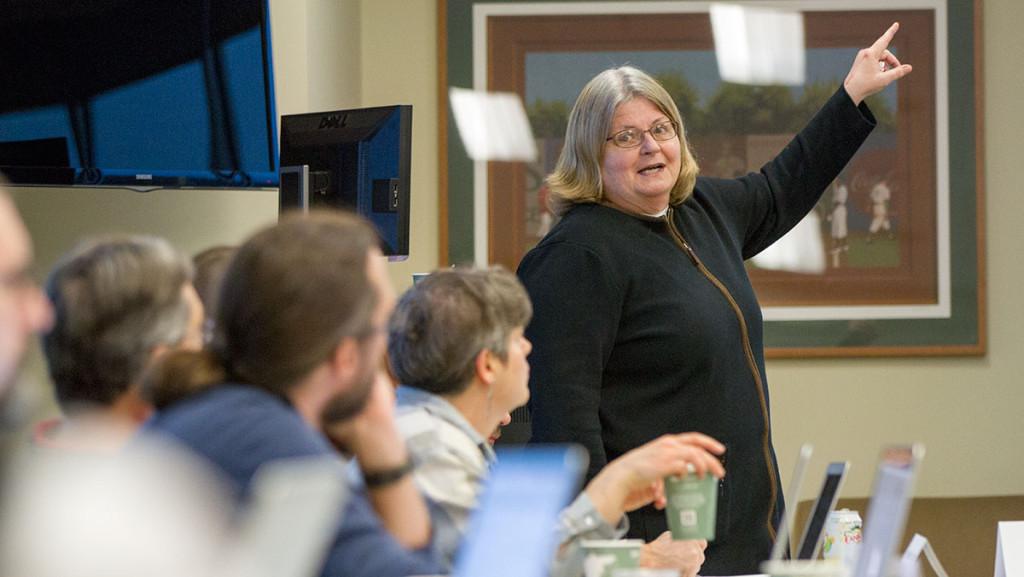The Ithaca College Adjunct Organizing Committee visited the Faculty Council on April 7 to ask members to sign a petition supporting unionization of part-time faculty. The council also discussed the possibility of independently reviewing the Integrative Core Curriculum and setting the final grade deadline for fall semesters to Dec. 30 during its April 7 meeting.
The four part-time faculty from the Adjunct Organizing Committee who addressed the council included art lecturer Brody Burroughs; Tom Schneller, lecturer of music theory, history and composition; and lecturers Bari Doeffinger and Robert Ziomkowski in the Department of Modern Languages and Literatures.
Burroughs said his committee isn’t asking the Faculty Council to take any official actions because the committee didn’t wish to put additional burden on the council members. Instead, the committee circulated a petition that called for improving working conditions of part-time faculty members.
“This is the best way you can help us,” Burroughs said. “As individuals, tenured and tenure-track faculty, this is your public declaration of your support that is valuable to us as we move forward.”
Burroughs said the current working conditions for part-time faculty make it difficult to sustain a living because they can’t teach enough courses.
“We can only work 12 credits a year, and there’s no mechanism in which we can turn this half-time job into a full-time job, other than to apply for a tenure-type position,” Burroughs said. “Being an adjunct for 10 years is not an asset.”
The petition that was given to the council received no signatures from the members, council chair Peter Rothbart, professor of music theory, history and composition, said.
The council also began discussion of possibly conducting its own review of the effectiveness of the college’s Integrative Core Curriculum independently from the administration at the suggestion of Rothbart.
There were mixed opinions regarding this proposal from several members of the council.
Stanley Seltzer, associate professor and chair of the Department of Mathematics, said he is not trying to defend the ICC but wondered whether evaluating the effectiveness of the ICC before any student has completed it would be a good idea.
Deborah Rifkin, associate professor of music theory, history and composition, said she was concerned the council acting on its own may create tension with the administration.
“I’m a little cautious about Faculty Council doing something independent from the ICC program itself,” Rifkin said. “I think that sets up an ‘us versus them’ dynamic, which I don’t think is necessary.”
Thomas Swensen, professor and chair of the Department of Exercise and Sport Sciences, said it wouldn’t be bad for the council to review the ICC because it has already proven to be conflictual for some students.
“No one’s been through four years of it, but after two years, it’s quite clear that there are pinch points,” Swensen said.
It has not been decided whether the council will conduct a review of its own, but Rothbart asked members to gather questions and comments from fellow faculty members about the ICC to discuss in the September or October meeting next semester.
The council also discussed the setting of the final grades due date to Dec. 30 for fall semesters.
Cindy Scheibe, professor in the Department of Psychology, proposed last semester to extend the grade deadlines for fall semesters to Dec. 30 from the previous deadline of 72 hours after the last exam takes place.
The purpose of the 72-hour turnaround was for students who needed to know their grades as soon as possible in case it affected their graduation, according to the minutes of the November 2008 faculty meeting. However, some faculty had difficulty completing grades in that timespan.
Rothbart said the extended deadline will give faculty more adequate time to grade all the students’ works.
“It gives faculty a little bit of breathing room, because before I was worried about how I could listen to 100 pieces of music in two days,” he said. “For me, this is a perfect example of a faculty-led initiative working creatively and collectively to solve a problem.”








